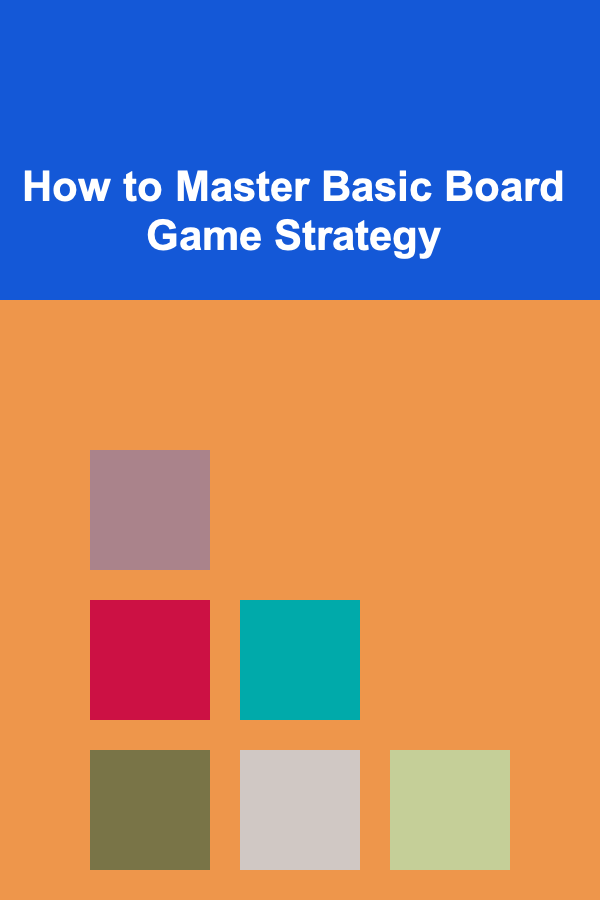
How to Master Basic Board Game Strategy
ebook include PDF & Audio bundle (Micro Guide)
$12.99$8.99
Limited Time Offer! Order within the next:

Board games have been a part of human culture for centuries, offering players both a fun and intellectually stimulating way to pass the time. Whether it's a simple game like checkers or a complex one like chess, mastering the basic strategies of these games can significantly enhance your enjoyment and improve your chances of winning. This article delves into the essential elements of mastering basic board game strategy, breaking down the approaches, techniques, and tips that will help you become a more skilled and strategic player.
Understanding the Basics
Before diving into advanced tactics, it's important to first understand the core mechanics of any board game. Each game is structured with its own rules, objectives, and constraints, which can vary significantly. However, most games share certain elements such as resource management, positioning, and decision-making, which all contribute to the strategic depth.
1. Know the Rules Inside and Out
The first step in mastering any board game is to understand its rules thoroughly. Even small misunderstandings or misinterpretations of the rules can lead to poor strategy and costly mistakes. Whether you are playing Monopoly, Settlers of Catan, or Risk, knowing the rules will allow you to plan your moves more effectively. Read the rulebook carefully, watch tutorial videos, or ask experienced players for clarification.
2. Practice Basic Moves and Develop Consistency
Once you understand the rules, practice basic moves and techniques until they become second nature. For example, in chess, practicing basic opening strategies and learning standard moves like castling can provide you with a solid foundation. In simpler games like checkers, mastering the skill of jumping and positioning your pieces effectively can give you a tactical advantage. The goal is to become comfortable with the basic moves so that you can focus on the more complex elements of strategy.
Strategic Thinking in Board Games
Effective strategy in board games is not about making random moves or relying on luck; it's about thinking ahead, anticipating your opponent's actions, and planning your moves accordingly. Let's break down several strategic thinking elements that will help you play more skillfully.
1. Anticipating Opponent Moves
One of the most critical skills in any board game is the ability to anticipate what your opponent is likely to do next. This skill is especially important in games like chess, where the game unfolds in a series of interconnected moves. By predicting your opponent's actions, you can plan your own moves more effectively.
In simpler games like tic-tac-toe, this might involve looking for patterns in your opponent's placement of pieces. In more complex games like Settlers of Catan, you can anticipate your opponent's resource needs and block key routes, preventing them from making progress.
2. Controlling the Center
In many board games, especially strategy-focused ones like chess and Go, controlling the center of the board is key to gaining an advantage. The center offers greater flexibility for movement and allows you to launch attacks from a more advantageous position. Similarly, in games like Risk, controlling central territories can give you a significant advantage, as it provides access to multiple regions and allows for better defense strategies.
3. Planning Multiple Moves Ahead
Just as chess players think multiple moves ahead, it's important to plan beyond your immediate move in virtually every board game. Look for opportunities to set up a future advantage or trap your opponent into making a mistake. For instance, in checkers, setting up your opponent for a forced move can lead to a more favorable position later in the game. By always thinking a few moves ahead, you can stay ahead of your opponent.
Managing Resources Wisely
In many board games, managing limited resources effectively is an essential part of the strategy. Whether it's money, cards, pieces, or time, how you use your resources will determine your chances of success.
1. Resource Allocation
In games like Settlers of Catan, resources such as wood, brick, and wheat are the lifeblood of your strategy. Deciding when and how to use your resources effectively can make the difference between success and failure. Early in the game, for example, you might focus on building roads to expand your territory, while later on, you might prioritize cities to increase your resource intake. Knowing how to allocate your resources strategically is crucial in managing your progress.
2. Managing Time
Time is also a resource, especially in timed games or when facing an opponent who is quicker at making decisions. In games like Scrabble, where players are under time pressure, you need to balance speed with strategic depth. Rushing through moves can lead to mistakes, while taking too much time might result in missed opportunities or a time penalty.
3. Maximizing Limited Moves
In games like Monopoly, every move counts. Each time you land on a property or choose to purchase something, it's essential to weigh the potential return on investment. Similarly, in card games like Poker or Magic: The Gathering, each card you play should be considered for its long-term value in combination with the other cards in your hand.
Psychological Strategy and Bluffing
Psychological strategy is a fundamental part of mastering board games. Whether it's reading your opponent's behavior or using tactics like bluffing, psychological techniques can give you a significant edge in competitive games.
1. Reading Your Opponent
Being able to read your opponent's body language, facial expressions, and playstyle can give you valuable insights into their strategy. In games like Poker, where bluffing is a core element, understanding when your opponent is likely to be bluffing or holding a strong hand can influence your decision to fold or call. In board games like Risk or Settlers of Catan, watching how your opponents react to various moves can help you gauge their level of confidence and plan your counter-strategy accordingly.
2. Bluffing and Misdirection
Bluffing is the art of deceiving your opponents into thinking you have a stronger position than you really do. While this is most common in card games, bluffing can be applied to many board games, such as when you create the illusion of having fewer resources than you actually do. In games like Poker or Diplomacy, convincing your opponents that you're weak when you're actually strong can lead them to make decisions that benefit you. The key to effective bluffing is consistency and subtlety, as overbluffing or being too obvious can backfire.
3. Creating Fear or Doubt
Another psychological strategy is to instill fear or doubt in your opponent's mind. In games like chess, you can force your opponent into making defensive moves by putting their pieces in danger. Similarly, in Monopoly or Risk, threatening to monopolize key areas of the board can create a sense of urgency in your opponent, causing them to make rushed decisions that might not be in their best interest.
Adapting to the Game Environment
Board games are not static; the environment and the state of the game evolve as you and your opponent make moves. Adapting to these changes and being flexible in your approach is crucial for success.
1. Adjusting Strategy Based on the Game's Progress
In many games, strategies need to evolve as the game progresses. For example, in chess, early moves are often about developing your pieces and controlling the board, while the mid-game focuses on maneuvering and positioning. As the game nears its end, the strategy shifts to checkmate. Similarly, in Settlers of Catan, early game strategies are centered on building roads and settlements, but as the game progresses, you need to shift focus to cities, development cards, and strategic trade.
2. Adapting to Changing Opponent Strategies
Your opponent's strategy can change throughout the game. In games like Monopoly, a player's strategy might evolve as they gain or lose property. A good strategist will be flexible enough to adapt their plan based on their opponent's shifting tactics. Recognizing when an opponent is vulnerable or when they are gaining strength can help you adjust your approach accordingly.
3. Responding to External Factors
In games like Risk or Diplomacy, external factors such as alliances, sudden shifts in the game environment, or changes in player behavior can influence your strategy. Being able to respond to these factors in a way that maximizes your position will give you an edge. For example, recognizing when an ally in Risk is weakening or when a new alliance forms in Diplomacy can lead you to reconsider your position and take a more advantageous approach.
Conclusion
Mastering basic board game strategy is a rewarding journey that involves understanding the game mechanics, thinking critically, managing resources, employing psychological tactics, and adapting to the game's evolving nature. While there is no single formula for success, the key lies in consistently applying strategic principles and learning from each game experience. By focusing on these foundational strategies, you can improve your performance, increase your chances of winning, and most importantly, enjoy the intellectual challenge that board games offer. With practice, patience, and perseverance, you'll develop the skills to outthink your opponents and become a master of basic board game strategy.
Other Products

Becoming a Successful Corporate Trainer: Essential Skills for Engaging and Inspiring Teams
Read More
How to Choose the Best Kitchen Cabinets for Your Renovation
Read More
How to Establish a System for Returning Items to Friends
Read More
How to Make Money Online as a Creator on Patreon
Read More
How to Maximize Your Savings with the Best Coupon Deals
Read More